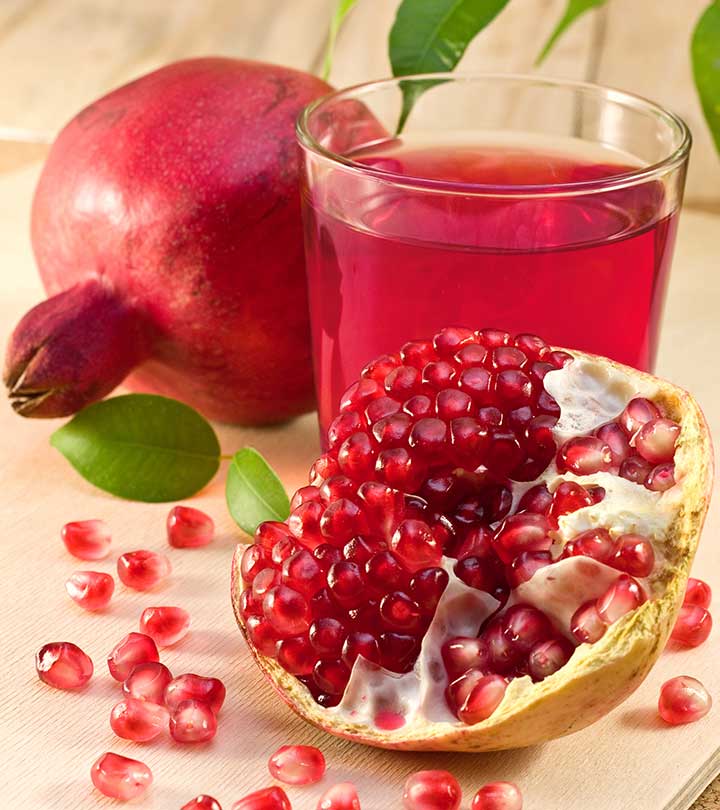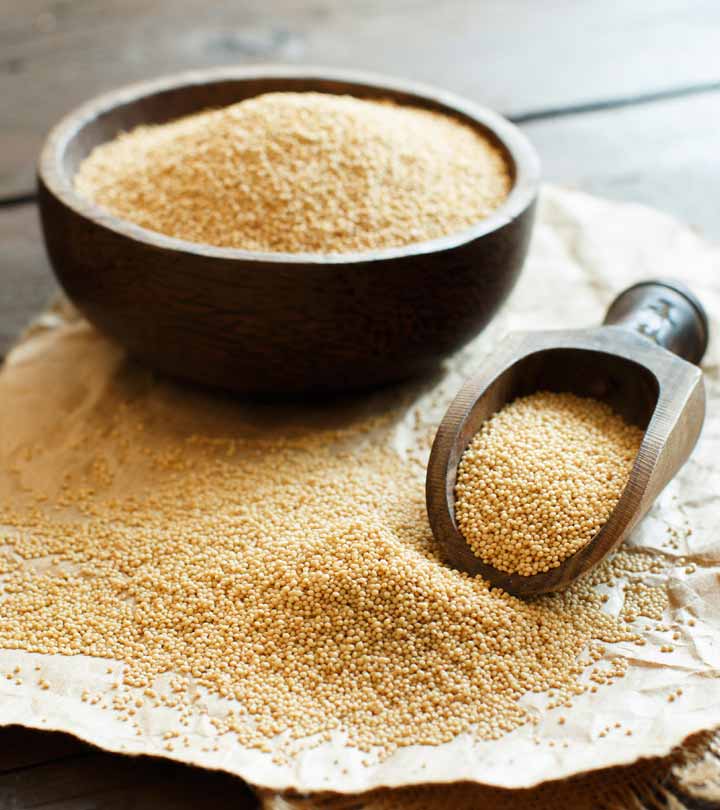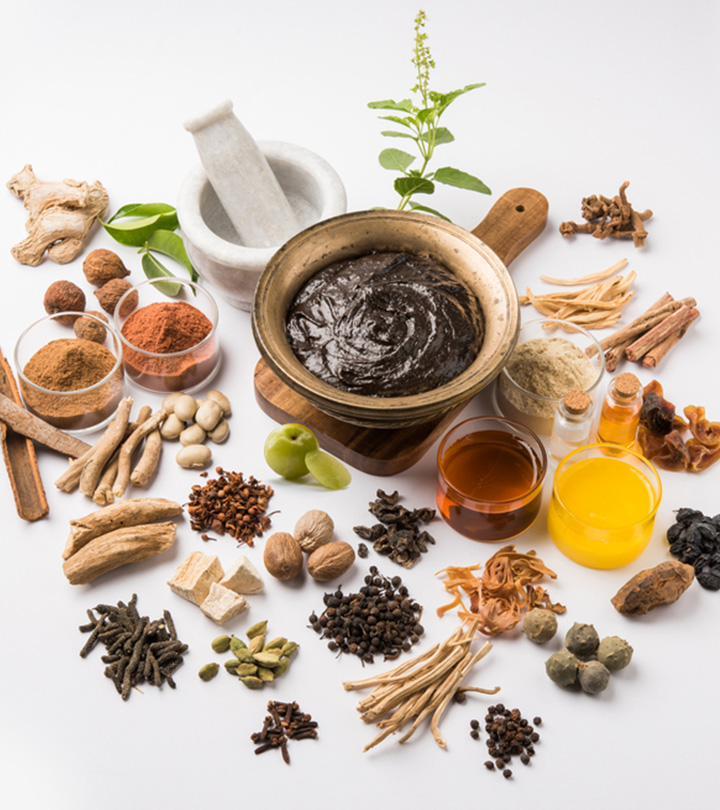The benefits of pomegranate juice have been documented since ancient times as it was widely renowned for its medical characteristics. It is naturally sweet and loaded with antioxidants, fiber, vitamins, minerals, and flavonoids.
Pomegranate, scientifically known as Punica granatum L. (Punicaceae), is a deciduous shrub. It is native to Iran and is cultivated widely in both the hemispheres.
The skin of the pomegranate fruit turns red when ripe but is generally not eaten. Inside are its arils that are used to extract the juice. This juice has been touted to treat various ailments. In this post, we will discuss the benefits pomegranate juice offers.
StyleCraze TriviaThe pomegranate is widely found in Egyptian mythology and art, extolled in the Bible’s Old Testament and the Babylonian Talmud, and was transported by caravans through the desert because of its thirst-quenching juice.
In This Article
What Are The Health Benefits Of Pomegranate Juice?
1. Help In The Treatment Of Skin Cancer
Several skin care products contain pomegranate as one of the ingredients for its strong protective effects on the skin. Pomegranate fruit is rich in antioxidants and protects the skin cells from the oxidative stress induced by UVB radiation (1).
Exposure to the sun and environmental factors are the leading causes of skin cancer. UVB radiation, in particular, is known to have severe damaging effects. UVB radiation can cause DNA and sun damage, irritation, and inflammation (2).
Pomegranate fruit extract was also found to protect from UVB-induced photoaging markers. It could help in the treatment of skin cancer (3).
Pomegranate fruit extract was also applied topically on mice, and the results suggest it could help in the prevention of skin cancer. However, more in-depth studies are warranted to confirm the findings (4).
In addition to fighting skin cancer, pomegranate juice may also delay the signs of skin aging, including wrinkles and fine lines (possibly because of its vitamin C content).
Some studies also show that pomegranate seeds (and their oil) can facilitate skin repair by promoting the regeneration of the epidermis (5).
2. Promote Weight Loss
Evidence states that pomegranates have been used in numerous instances to promote weight loss. This can be attributed to the fiber in the fruits.
Studies also show that pomegranate and its extracts can play a role in fat reduction. However, more human studies are needed to understand its role in preventing obesity (6). In mice studies, the seeds, and especially the pomegranate leaf extract, were found to induce fat loss. This can be a positive step towards healthy weight loss (7).
Related: Vegetarian Diet Plan For Weight Loss – Foods List, Health Benefits, Precautions
3. Beneficial During Pregnancy
Shutterstock
Pomegranate juice may reduce pregnancy complications. Some research shows that the juice can reduce oxidative stress in the human placenta, which is key to a pregnancy outcome (8). More studies are warranted to understand the mechanism.
4. Prevent Colon Cancer
Drinking pomegranate juice may reduce the risk factors associated with colon cancer. The tannins, ellagic acid, and punicalagin in pomegranate juice have antiproliferativei XTending to suppress cell growth, especially the growth of malignant cells into the surrounding tissue. effects on colon cells (9).
Researchers observed that the ellagitannins in pomegranate juice could also play a role in the prevention of colon cancer (10).
These are the many benefits of pomegranate juice. We know eating fruits on a regular basis is key for optimal health. While eating the arils of the pomegranate fruit may be slightly cumbersome, drinking its juice is easy.
The juice can also play a role in preventing the cancers of the lung (11).
Related: 16 Natural Ways To Cleanse Your Colon With Remedies And Prevention Tips
5. Treat Fatty Liver Disease
Pomegranate seeds reduce oxidative stress and inflammation, and, as a result, help fight fatty liver disease. In rat studies, regular consumption of pomegranates was found to prevent non-alcoholic fatty liver disease (12).
In another rat study, the fruit was found to protect the liver and other organs in jaundice (13).
6. Clear Clogged Arteries
Pomegranate juice is rich in antioxidants and polyphenols. Research shows that these organic compounds possess anti-atherogenic propertiesi XProperty of any substance or compound that protects the body against atherogenesis by inhibiting the formation of plaques in the arteries. (14).
Atherosclerosis is a disease that causes the blood vessels in the arteries to narrow down due to plaque build-up.
A study shows that pomegranate juice enhances nitric oxide synthase and prevents nitric oxide from oxidative destruction (15). It is believed that this may help reverse atherosclerosis lesions.
In another research, advanced atherosclerotic patients with carotid artery stenosis, when regularly administered with pomegranate juice during the period of study, showed significant improvement in health conditions (16).
7. Prevent Cardiovascular Disease
Shutterstock
Pomegranate and its powerful components have been in use in medical science to alleviate coronary artery disease, hypertension, and peripheral artery disease (17).
Arterial hypertension increases the risk of cardiovascular diseases. Scientists have investigated and believe that pomegranate juice reduces stress in coronary artery endothelial cells (18).
Cardiovascular diseases can also be caused by drugs or chemicals. Further experiments show that pomegranate fruit extracts offer protection against cardiotoxicityi XCardiac damage brought on by cancer therapy, especially in those who have undergone chemotherapy or are on certain medications. (19).
8. Help Treat Erectile Dysfunction
The antioxidants in pomegranate juice reduce oxidative stress and inflammation, both of which can lead to erectile dysfunction.
In a trial experiment, pomegranate juice was found to improve mild to moderate erectile dysfunction (20).
In another clinical trial, scientists were able to determine that phytochemicals in pomegranate juice reduced oxidative stress and suggested that future studies may reveal more on its benefit in treating various urologic health conditions in men, along with erectile dysfunction (21).
9. Lower Blood Cholesterol Levels
Shutterstock
Pomegranate contains high amounts of polyphenols and other antioxidants that are three times more than what we find in green tea and red wine (22). These antioxidants can help lower bad cholesterol.
Statistical data collected in a study involving some patients showed a significant reduction in plasma LDL after consuming pomegranate juice (23).
In another animal study, scholars revealed the lipid-lowering factors present in pomegranate juice and guided how it can be used in dyslipidemiai XAbnormally high levels of blood fat or cholesterol that raise the risk of heart attack, stroke, and clogged arteries. (24).
It was also noted that phytosterols present in pomegranate could reduce serum LDL (25).
10. Help Treat Prostate Cancer
Investigations involving both animal and human models show that pomegranate juice can improve prostate cancer (11).
Clinical evidence suggests that pomegranate fruit extract decreases serum prostate-specific antigen levels and, therefore, may possess both chemotherapeutic and chemopreventive effects against prostate cancer (26).
Moreover, scientists have more recently revealed that ellagic acid, luteolin, and punicic acid present in pomegranate juice inhibit the growth of prostate cancer (27). This means that pomegranate juice can also prolong the survival of prostate cancer patients (28).
11. Lower Blood Pressure
Studies show that pomegranate juice can lower blood pressure (29). Both systolic and diastolic blood pressure could be brought down with regular administration or consumption of pomegranate juice.
Findings collected from animal and clinical studies indicate that drinking pomegranate juice can reduce blood pressure, both short-term and long-term (30).
Related: 15 Simple & Natural Ways To Lower Your Blood Pressure At Home
12. Boost Fertility and Increase Testosterone Levels
In mythology, pomegranate is considered to be an aphrodisiac fruit. Evidence-based clinical studies state that drinking natural pomegranate juice regularly lowers stress, reduces cortisol, promotes well-being, and increases sex drive in both men and women (31).
In rat studies, pomegranate juice was also found to improve sperm quality and motility, boost testosterone levels, increase epididymal sperm concentration, and decrease the rates of abnormal sperm (32).
Another rat study proposes that pomegranate juice extract can impact sex hormones in females with polycystic ovary syndrome (33). The study further elucidates that pomegranate extract increases testosterone levels.
13. Treat Kidney Stones
Several studies have linked oxidative stress to kidney stone formation (34), (35). As discussed earlier, pomegranate juice fights oxidative stress.
A pilot study indicated that supersaturation of calcium oxalate could be lowered with pomegranate juice (36).
Another experiment on animal models showed the protective effects of pomegranate juice on crystal formation in kidneys (37).
14. Aid Diabetes Treatment
Researchers have established that pomegranate juice reduces oxidative stress and lipid peroxidation in cells that affect type 2 diabetes. However, more clinical studies are needed before pomegranate or its juice can be medically recommended for diabetes treatment (38).
Certain organic compounds in pomegranate have been found to be antidiabetic. These include gallic, ursolic, and oleanolic acids (39).
15. Manage Arthritis
The anti-inflammatory properties of pomegranate juice may have beneficial effects in cases of osteoarthritis (40). The compounds present in pomegranate can slow down cartilagei XStrong and flexible connective tissue that acts as a shock absorber and shields the bones and joints from damage. deterioration and block the enzymes that lead to osteoarthritis (41).
Rheumatoid arthritis (RA), which is characterized by inflammation, pain, and stiffness, can be managed with pomegranate juice intake. Although this claim needs further evidence supported by clinical trials, scholars who have conducted studies on mice reveal that pomegranate juice may have positive effects on RA (42).
16. Treatment Of Alzheimer’s Disease
A 15-month study revealed that long-term dietary supplementation with pomegranate juice increased autophagy (regular degradation and recycling of cell components), inhibited inflammation, and decreased cerebral amyloid beta aggregates (43).
Other studies have also led to the understanding of the neuroprotectivei XAny substance with properties to protect the nerve cells from harm, deterioration, or functional impairment. effects in pomegranate (44). The juice was found to increase memory and prevent memory loss as well (45).
17. May Reduce Breast Cancer Risk
Shutterstock
Drinking pomegranate juice may have potential benefits to slow or even prevent the growth of breast cancer. Laboratory tests suggest that ellagitannins found in pomegranate juice can stop estrogen production – and this may help prevent breast cancer (which is usually estrogen-responsive) (46).
It has also been proven that pomegranate has ant i-proliferative properties that can downregulate estrogen-responsive genes (47).
18. Promote Oral Health
Recent studies have proven that pomegranates work wonderfully well in strengthening the gums and fastening loose teeth. They are also effective against oral bacteria as they possess antimicrobial properties. Research has found that pomegranate seeds can have a positive effect on dental plaque microorganisms (48).
In another study, a gel made from the fruit was found to be effective in treating gingivitisi XA gum condition characterized by irritated and swollen gums caused by chronic oral hygiene issues. (49).
19. Boost Digestive Health
Pomegranate seeds boost digestive health as they have B-complex vitamins. These vitamins help your body convert fat, protein, and carbohydrates into energy. The seeds also contain fiber, another essential nutrient for digestion. This fiber prevents and treats constipation as well.
As the seeds have anti-inflammatory properties, they can treat other gastrointestinal issues, like ulcerative colitis (50).
But please keep in mind that pomegranate is an acidic food (has a pH of 3), and it can aggravate certain digestive problems like heartburn, acid reflux, or GERD (and stomach and mouth ulcers as well). Hence, check with your doctor in this regard.
20. Strengthen The Immune System
The powerful antioxidants in pomegranate seeds strengthen the immune system. Studies show how they can effectively combat bacteria and viruses that affect human health (51).
Not just that, pomegranates also help treat several other ailments associated with a weakened immune system. A preliminary study (we need more information, though) states that pomegranate may help treat obstructive pulmonary diseasei XLung disease that impairs breathing by obstructing airflow, leading to shortness of breath, wheezing, or persistent cough. (52). Though the fruit hadn’t improved the effects of the drugs, there is hope.
In the following section, we will look at the nutritional profile of pomegranate juice.
What Is The Nutritional Profile Of Pomegranate Juice?
Fresh pomegranate juice is a nutrition powerhouse packed with abundant vitamins, minerals, dietary fiber, fatty acids, and zero cholesterol. Surprisingly, it is also low in calories.
According to the USDA, these are the nutrients present in every 100 grams of fresh pomegranate juice:
- Energy: 54 kcal
- Protein: 0.15 g
- Carbohydrate: 13.13 g
- Dietary fiber: 0.1 g
- Sugar: 12.65 g
Source: United States Department of Agriculture
Pomegranate juice is rich in nutrients, such as vitamin A, thiamin, niacin, folate, riboflavin, potassium, magnesium, zinc, and calcium. It also contains various organic acids, like ascorbic acid, citric acid, malic acid, and fumaric acid, and amino acids like methionine, proline, and valine.
How To Make Pomegranate Juice
Shutterstock
Making pomegranate juice is not as difficult as you might think. Before you begin, make sure the pomegranates you have bought are fresh and in perfect condition. The healthy peel of a ripe pomegranate is red or dark red and always smooth and shiny. You can also go for organic pomegranates if available locally.
What You Need
- 8 pomegranates
- A knife
- A medium-sized bowl
- Water
- Blender
- 2 serving glasses
Directions
- Wash the pomegranates under running water.
- Remove the crown and the bottom.
- Make mildly deep incisions on the skin from top to bottom, preferably making four or five divisions.
- Follow each division to remove the skin gently.
- Once the arils appear, keep the pomegranates aside.
- Pour water in a medium-sized bowl.
- Take each pomegranate division and break it underneath the water to avoid a mess. Separate the arils.
- Rinse the arils, pour them in the blender, and blend.
- You can either remove the seeds and thick pulp and strain the juice. The latter contains fiber and is more like a smoothie-consistency.
- Serve chilled.
Making pomegranate juice is simple. You can have the juice every day and reap the many benefits it offers. In the following section, we will look at the nutritional profile of pomegranate juice.
Fun FactIn the olden days in Iran, the common people tenderized meat by marinating it in pomegranate juice, while the royal chefs used vinegar for the same purpose.
But we need to keep something else in mind.
What Are The Side Effects Of Pomegranate Juice?
Drinking pomegranate juice is safe, provided it is taken within the prescribed limits. Further research is warranted to establish its side effects.
As we have seen, pomegranate juice can lower blood pressure levels (29). Hence, excess intake of the juice may lower your blood pressure way too much. People already taking medications to reduce blood pressure should avoid the juice.
Pomegranate juice is rich in potassium, and excess intake may lead to hyperkalemia (high potassium levels) in those at risk, including people with kidney disease. However, there is less research in this regard.
Though some drug interactions with pomegranate juice have been observed in animal and test-tube studies, the juice could be safe for humans. For instance, in humans, the juice had no adverse effects on the effects of an enzyme (called CYP2C9) in humans. The CYP2C9 enzyme is responsible for metabolizing drugs related to diabetes, heart health, and blood clots (53).
The many health benefits of pomegranate juice is primarily due to its rich antioxidant content. Rich in vitamins, minerals, and flavonoids, pomegranate juice is found to be effective in preventing skin and colon cancer, while promoting healthy digestion, improving metabolism, and aiding weight loss. It is also beneficial in regulating your blood sugar and blood pressure levels, along with helping with erectile dysfunction and fertility issues. While pomegranate juice helps detoxify and cleanse your system boosting your overall immunity, it should be taken in moderation, especially for people with kidney issues.





